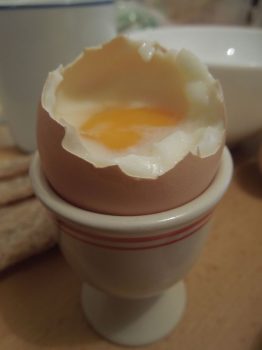Va te faire cuire un œuf!* Posted by Tim Hildreth on Dec 27, 2016 in Culture, Vocabulary
It is said that the classic French chef’s hat has 100 folds, one for each way to cook an egg. This morning over breakfast as I wondered what to write about this week, I found the answer right there in front of me . . . dans mon assiette! (in my plate)** So this week, nous allons parler des façons de cuire un œuf! (we’re going to talk about ways to cook an egg!)
There may or may not be 100 ways de faire cuire un œuf (to cook an egg) but if you find yourself in France pour le petit-déjeuner (for breakfast) one day, here is a list of useful vocabulary to help you with your eggs***:
| un œuf | egg |
| les œufs | eggs |
| le jaune d’œuf | yolk |
| les blancs d’œufs | egg whites |
| le coquille | shell |
| des œufs durs | hard-boiled eggs |
| un œuf a la coque | soft-boiled egg (in the shell) |
| des œufs brouillés | scrambled eggs |
| des œufs sur le plat | fried eggs (sunny side up) |
| des œufs tournés | eggs over easy**** |
| une omelette | omelet |
Here’s a link to la recette (the recipe) for one of my favorite (and easy) French egg dishes, une omelette aux pommes de terre (a potato and herb omelet).
* This is a very common French expression. It’s a way to tell someone to leave you alone, or to go take care of their own business. You’ll often hear it used when one person has had enough of someone else and wants to be left alone.
** Another great French expression is “Ne pas être dans son assiette” (lit. ‘to not be in one’s plate’) which means “to be out of sorts, physically or emotionally” as in “Pierre n’a pas l’air d’être dans son assiette aujourd’hui. Est-ce que tu croit qu’il soit malade?” (Peter seems out of sorts today. Do you think he might be sick?). Two things to be aware of: assiette (plate) is feminin (une assiette); we use the possessive pronoun ‘son’ instead of ‘sa‘ though, of course, because assiette starts with a vowel; and the use of assiette in this particular case – and the expression itself – goes back to before the word assiette meant plate. The term assiette has it’s origins in the verb ‘asseoir’ (to sit or be seated) and referred to the position of a rider seated on a horse.
*** Eggs aren’t just pour le petit-déjeuner, bien sur! In France, you’ll often find eggs pour le déjeuner et le dîner aussi. (for lunch and dinner too.) IN fact, you might be surprised at some of the places you’ll find eggs on the menu in France. It is very common to find a fried egg on your pizza . . . or your hamburger! A very common entrée (appetizer) in French cafés is des œufs mayonnaise (a hard boiled egg, cut in two, with a side of fresh mayonnaise).
**** Like everything else in France, eggs tend to be cooked as little as possible. The most common way to get a fried egg is sur le plat. If you prefer your fried eggs more well done, you can ask for them to be tournés, but then you’re likely to find they’re over well.
Photo credits:
^ By O sorbet d’amour – Own work, CC BY-SA 4.0, https://commons.wikimedia.org/w/index.php?curid=43331022
^^ By Isabelle Ducau – Own work, CC BY-SA 4.0, https://commons.wikimedia.org/w/index.php?curid=45564129

Build vocabulary, practice pronunciation, and more with Transparent Language Online. Available anytime, anywhere, on any device.




